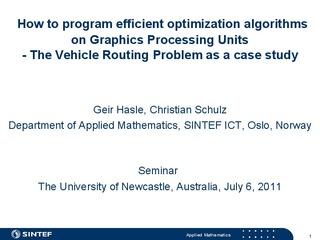| dc.contributor.author | Hasle, Geir | |
| dc.contributor.author | Schulz, Christian Ferdinand | |
| dc.date.accessioned | 2017-02-08T12:33:04Z | |
| dc.date.available | 2017-02-08T12:33:04Z | |
| dc.date.created | 2015-09-24T20:52:59Z | |
| dc.date.issued | 2011 | |
| dc.identifier.uri | http://hdl.handle.net/11250/2429999 | |
| dc.description.abstract | Modern PCs are parallel and heterogeneous, with a growing number of cores for task parallelism and ever more powerful data parallel accelerators. The glory days when you could go to the beach for two years, and your sequential optimization program would run twice as fast on a new PC when you got back, are gone due to technological limits. To utilize the computing power of modern PCs and profit from future hardware developments you need to rewrite your sequential code and even rethink your optimization methods. I will go through the recent change in processor development and its repercussions. The potential of heterogeneous computing will be illustrated with fresh results from a GPU-based VRP solver developed at SINTEF. Speculative ideas for a self-adaptive, heterogeneous VRP solver will conclude my talk. | |
| dc.description.abstract | How to program efficient optimization algorithms on Graphics Processing Units - The Vehicle Routing Problem as a case study | |
| dc.language.iso | eng | nb_NO |
| dc.title | How to program efficient optimization algorithms on Graphics Processing Units - The Vehicle Routing Problem as a case study | nb_NO |
| dc.type | Lecture | nb_NO |
| dc.identifier.cristin | 1272888 | |
| dc.relation.project | Norges forskningsråd: 205298 | nb_NO |
| cristin.unitcode | 7401,90,11,0 | |
| cristin.unitname | Anvendt matematikk | |
| cristin.ispublished | true | |
| cristin.fulltext | postprint | |
